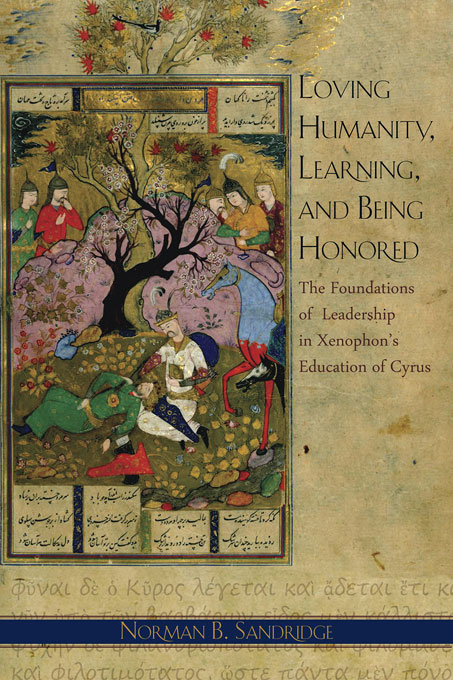 The Center for Hellenic Studies is pleased to announce the publication of Loving Humanity, Learning, and Being Honored: The Foundations of Leadership in Xenophon’s Education of Cyrus by Norman B. Sandridge, available now through Harvard University Press. You can preview this work by downloading the introduction here.
The Center for Hellenic Studies is pleased to announce the publication of Loving Humanity, Learning, and Being Honored: The Foundations of Leadership in Xenophon’s Education of Cyrus by Norman B. Sandridge, available now through Harvard University Press. You can preview this work by downloading the introduction here.
Xenophon is generally thought to have done his best theorizing on leadership through his portrayal of Cyrus the Great, the first king of the Persian Empire. In this book, Norman Sandridge argues that Xenophon actually reduces his Theory of Leadership to a set of fundamental traits, namely, the love of humanity, the love of learning, and the love of being honored. These so-called fundamental traits are the product of several rich contexts across culture and across time: the portrait of Cyrus seems as much a composite of Persian folklore as a pointed response to Plato’s Philosopher King. Sandridge further argues that Xenophon’s Theory of Leadership is effective for addressing many problems of leadership that were familiar to Xenophon and his fourth-century Athenian contemporaries, notably Plato and Isocrates. By looking at the contexts in which Xenophon’s theory was conceived, as well as the problems of leadership he sought to address, this book sees Xenophon as attempting a sincerely laudatory though not ideal portrait of Cyrus. The study thus falls between interpretations of the Education of Cyrus that have seen Cyrus as either a perfect leader or an ironically flawed one.
This monograph will be of interests to a wide audience including students and scholars of ancient history, narratology, leadership, education, and philosophy, among others.
Sandridge is also one of the primary collaborators on Cyrus’ Paradise, the world’s first comprehensive, online, communal commentary or “communtary” for a Classical text: Xenophon’s Education of Cyrus (Cyropaedia). You can learn more about this classicist and his work on Xenophon, education, and leadership by reading our interview, “In Dialogue: Rethinking Xenophon and Education with Norman Sandridge.”
Scholars interested in this work might also be interested in W. Robert Connor’s,
“Great Expectations: The Expected and the Unexpected in Thucydides and in Liberal Education.” To find an extensive selection of research on ancient Greek civilization and literature, visit the CHS online at chs.harvard.edu.
-
Fellowships
- Fellowships in Hellenic Studies
- Early Career Fellowships
- Summer Fellowships
- CHS-IHR Joint Fellowship
- Current Fellows in Hellenic Studies
- Previous Fellows Previous Fellows – Chronological Lists
